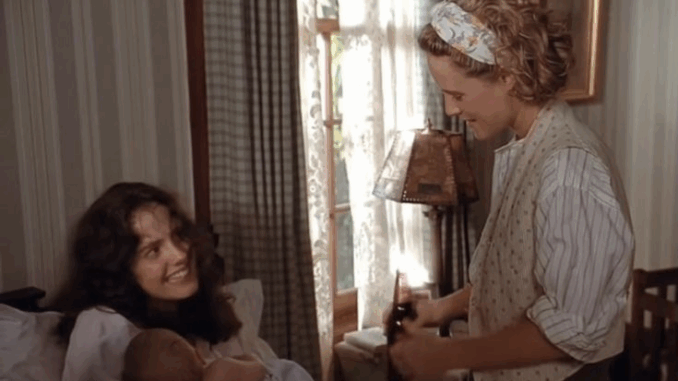
In Fried Green Tomatoes, much of the narrative is framed around the present-day experiences of Evelyn Couch, a middle-aged housewife on the brink of emotional collapse. Overlooked, dismissed, and deeply unsatisfied, Evelyn begins the film feeling invisible — to her husband, to society, and even to herself.
But by the end, Evelyn emerges with a renewed sense of identity and power. Her transformation is not just heartwarming; it is revolutionary. Evelyn’s story is a modern parable for countless women who have been told they are too old, too soft, or too insignificant to make a change.
A Woman Lost in the Aisles of Life
When we first meet Evelyn Couch, she’s trailing her husband through the halls of a nursing home, trying to spark a connection in a marriage that has grown cold and routine. Her life is dictated by others — her husband’s preferences, society’s expectations, the ever-present pressure to shrink herself for the comfort of those around her.
She attends self-help seminars. She buys all the right products. She diets. She’s trying to “fix” herself, when in fact, the problem lies in the world that’s conditioned her to believe she’s broken.
Evelyn is every woman who’s ever been told she’s too much and not enough — all at once.
Meeting Ninny: The Spark of Rebirth
The turning point in Evelyn’s life begins when she meets Ninny Threadgoode, a lively elderly woman with a gift for storytelling. Through Ninny’s vivid recollections of Idgie Threadgoode, Ruth Jamison, and the Whistle Stop Café, Evelyn begins to reimagine her own life.
Ninny doesn’t lecture or advise — she simply tells stories. And in those stories, Evelyn finds courage, anger, and hope. She hears about women who resisted oppression, who fought for love, who found family in each other and defied the roles society tried to force on them.
For Evelyn, Ninny becomes a mirror and a muse. The past awakens something in her that was long buried — the desire to live on her own terms.
The Birth of Towanda: Feminine Rage as Reclamation

One of the most iconic and cathartic moments in the film comes when Evelyn, frustrated by a younger woman stealing her parking space, rams the car with her own and proudly shouts, “Towanda!”
This isn’t just comic relief — it’s symbolic. Towanda is the name Evelyn gives to her alter ego, a fearless warrior woman who fights back, takes up space, and no longer apologizes for existing.
In creating Towanda, Evelyn doesn’t lose herself — she finds a piece that was always there. The moment encapsulates the suppressed rage of so many women who’ve been conditioned to smile and stay silent. Evelyn’s outburst is both a protest and a proclamation: she is done being ignored.
From Submission to Self-Assertion
Evelyn’s transformation is gradual and believable. She doesn’t suddenly become an entirely different person — she evolves. She begins standing up for herself, challenging her inattentive husband, dressing differently, eating what she wants, and expressing emotion without shame.
She stops shrinking.
What makes Evelyn’s arc so powerful is that it doesn’t rely on external validation. She doesn’t need a new man or a dramatic makeover. Her empowerment comes from within — fueled by friendship, storytelling, and finally listening to the voice that’s been inside her all along.
A Feminist Journey Without the Label
Interestingly, the film never explicitly labels Evelyn’s journey as “feminist,” but it is undoubtedly one of the most empowering feminist arcs in 1990s cinema. It’s about a woman waking up — not just to her own pain, but to the possibility of joy.
Evelyn doesn’t seek to dominate; she seeks to participate in her own life. She wants agency, connection, and meaning — things women of all ages are too often denied.
Her character speaks especially to older women, a demographic Hollywood frequently sidelines. Evelyn proves that transformation isn’t reserved for the young — that rediscovery and rebellion can happen at any stage of life.
The Power of Intergenerational Storytelling
Evelyn and Ninny’s relationship is a beautiful portrayal of what happens when women from different generations share their truths. Ninny doesn’t lecture Evelyn into change; she invites her into a world where women fought, failed, and kept going.
Through Ninny’s stories of Whistle Stop and its fierce female friendships, Evelyn finds both a role model in Idgie and a new kind of roadmap — one that doesn’t lead to perfection, but to authenticity.
It’s a reminder that storytelling is not just entertainment — it’s a form of survival. And it’s through hearing another woman’s story that Evelyn begins to rewrite her own.
Final Thought
Evelyn Couch may have entered Fried Green Tomatoes as a timid, disheartened housewife, but she exits as something entirely new: a woman reborn. Her journey from invisibility to invincibility is a tribute to every woman who has ever questioned her worth, her strength, or her right to be heard.
By embracing her inner “Towanda,” Evelyn teaches us that it is never too late to reclaim your life — and that sometimes, all it takes is a good story, a true friend, and the courage to say, “I matter.”
